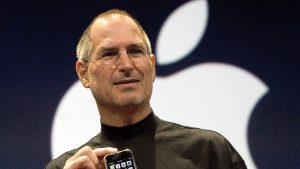
NOVA MCGILL
Contributor
Steve Jobs, the co-founder of Apple Inc., passed away on October 5, 2011 at just 56 years old after a long battle with pancreatic cancer. Jobs wasn’t just a businessman—he was a visionary who forever changed how people interact with technology. From the Macintosh computer to the iPod, iPhone, and iPad, his creations became part of daily life around the globe. He had a rare gift for blending sleek designs with powerful technology. In doing so, he redefined modern culture.
Jobs’s story began on February 24, 1955 in San Francisco, California. Born to graduate students Joanne Schieble and Abdulfattah Jandali, a Syrian immigrant, he was adopted shortly after birth by Paul and Clara Jobs. Raised in Cupertino, California—the future hub of Silicon Valley—he grew up fascinated by electronics. After finishing high school, he briefly attended Reed College in Oregon before dropping out, a decision that freed him to follow his own curiosity. His early adventures, including working at Atari, traveling to India and practicing Zen Buddhism, gave him a unique perspective on both life and innovation.
In 1976, Jobs teamed up with his friend Stephen Wozniak to start Apple in his parents’ garage. What began as a small project soon forever reshaped the computer world. The Apple II, launched in 1977, was one of the first widely popular personal computers, and the Macintosh in 1984 introduced the idea that computers can be friendly and intuitive, thanks to its graphical interface. By the age of 25, Jobs was a multimillionaire. But his bold and often uncompromising leadership style caused clashes at Apple, and in 1985, he was forced out of the company that he had helped create.
Jobs didn’t stop there. That same year, he founded NeXT, a company that focused on building advanced computers. While NeXT’s products never broke into the mainstream, the technology proved pivotal—Tim Berners Lee built the first version of the World Wide Web on a NeXT computer. Around this time, Jobs also leaped into animation by buying a small studio from George Lucas. He renamed it Pixar, and under his leadership it created Toy Story, the first feature-length computer-animated film. Pixar went on to produce some of the most beloved movies of its time, and when Disney acquired the studio in 2006, Jobs became the largest individual shareholder in the company.
Meanwhile, Apple was struggling without him. In 1997, after buying NeXT, the company brought Jobs back. What followed was one of the greatest comebacks in business history. With his relentless drive for perfection and keen sense of what people wanted before they knew it themselves, Jobs turned Apple into one of the most valuable companies in the world. The iPod, iPhone, and iPad weren’t just gadgets—they became cultural icons that changed the way people listen to music, connected, and worked. His product launches, complete with his signature black turtleneck and jeans, became events that people eagerly anticipated.
Even while facing serious health issues—including pancreatic cancer surgery in 2004 and a liver transplant in 2009-Jobs continued to lead Apple with intensity and vision. He finally stepped down as CEO in August 2011, only weeks before his passing at his home in Palo Alto, California. At the time, his net worth exceeded $7 billion, but his true legacy laid in the way he had transformed entire industries. As biographer Walter Isaacson noted, Jobs earned a place in history alongside innovators like Thomas Edison and Henry Ford. And more than a decade later, his influence is still felt every time someone unlocks their smartphone, streams a movie, or listens to music on a digital device.
Photo by Apple

